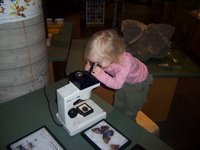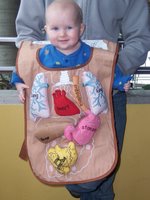Today Fin started outputing more than usual. Katharine picked up some paedialites at the pharmacy & began replacing Fin's food with the paedialites 1:1.
At three-ish, I left work early to pick Katharine & the girls up and together we headed to Emergency at
SickKids. She's been put on IV fluids & taken off of foods to give her stomach a rest while her virus runs its course.
It's 2am, and Winnifred & I just recently arrived at home -- unfortunately Katharine and Findley are still in observation until around 3 when paediatrics will finish their rounds and admin Findley into a room.
While we were waiting in Emergency, Winnifred and I were looking at a poster of cats when we heard:
"What, are, you, doing, here?"
We turned around to see Findley's surgeon, Dr. Annie Fecteau, who was on call that evening. She looked a little horrified to see us standing there, so I brought her up to speed on Findley's condition.
The thing about Findley & Dr. Fecteau is that as soon as Dr. Fecteau first operated on Findley, she, Dr. Fecteau became Findley's primary physician. Findley still has a Paediatrician, a
GI team, a Nutruitionist, a Geneticist, a General Practitioner, and a few other teams that I'm forgetting at the moment. But, even if Findley develops a cold, Dr. Fecteau is her primary physician.
Imagine that, having a transplant surgeon being the first person you see as soon as you get sick.
Hopefully this stay at the hospital won't last more than five days or so. It will be interesting to find out what a stay in Paediatrics will be like. Most of our experience is on the surgical ward.
That said, here are a few comparison pictures of Fin in August, and her in January:

















